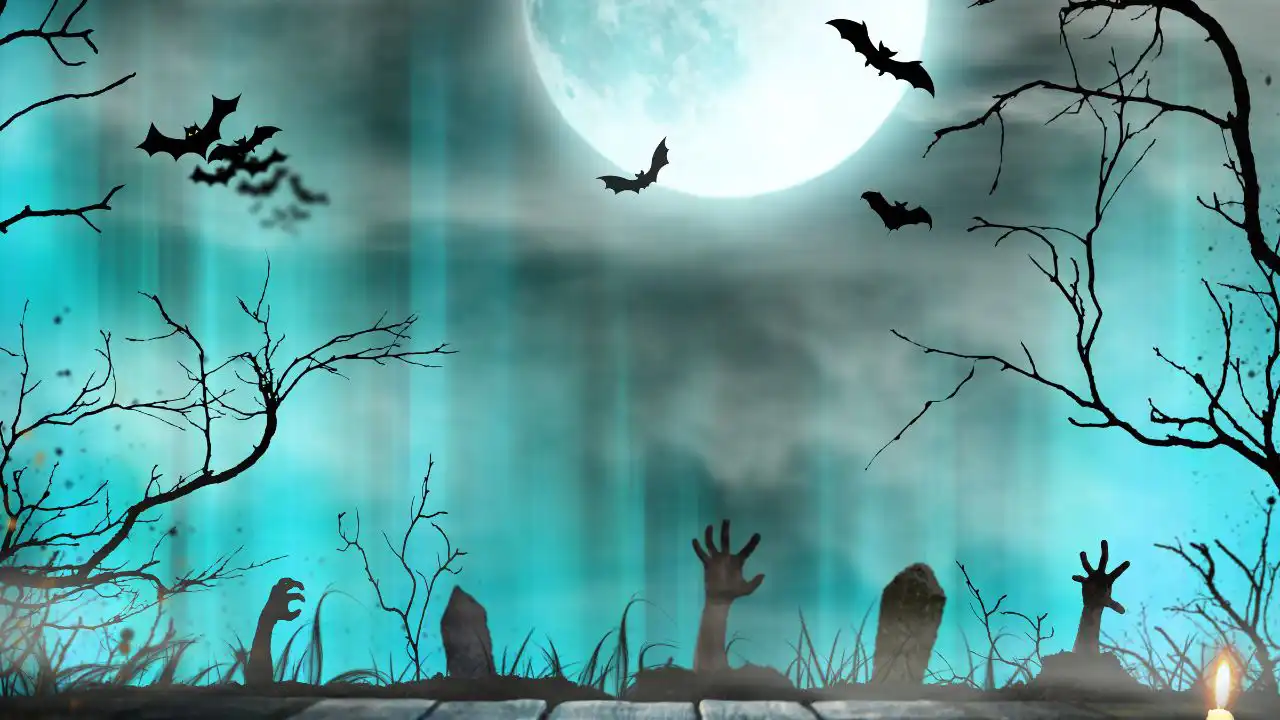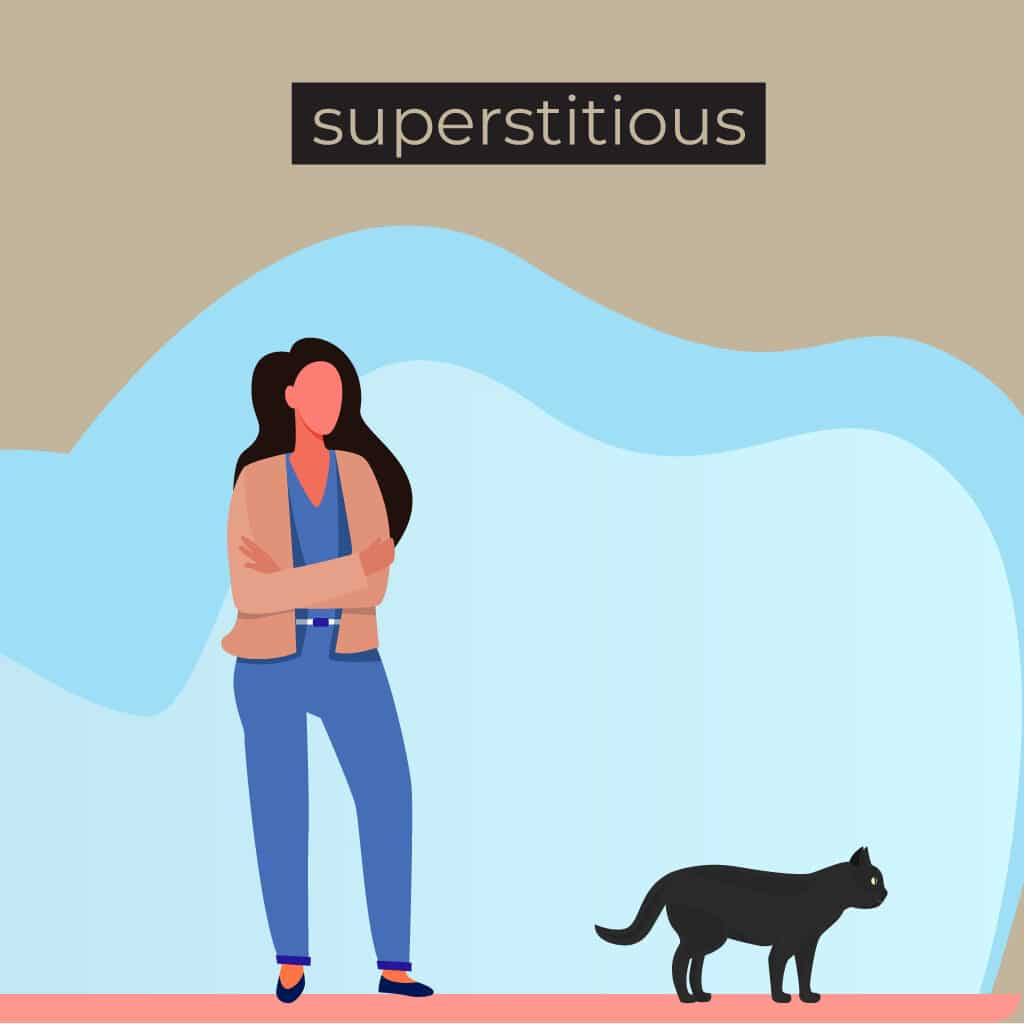
GRE Newsletter Subscribe
Enter your email address below and subscribe to our newsletter

Enter your email address below and subscribe to our newsletter

Hello folks, welcome to the 13th GRE English Words List. This series of blogs deals with Essential Words for the GRE and helps GRE aspirants bolster their GRE Verbal Preparation, and ace the GRE Verbal section.
If you haven’t already, check out our previous ‘GRE English Words’ blogs here.
13 is a number considered unlucky in many cultures. It even scares some people so much, there’s a phobia named after it. So, for this blog’s theme, I wanted to explore superstitions & fear, and how these manifest, and pervade different cultures.
This week’s words are Triskaidekaphobic, Knock On Wood, Jinxed, Eerie, and Superstitious.
Part of Speech – adjective
Definition – extreme superstition regarding the number thirteen.
Word Origins – from Greek treiskaideka meaning ‘thirteen’ + -phobia.
Synonyms – fear of the number thirteen.
Usage – This hotel doesn’t have a 13th floor because the owner is triskaidekaphobic.
Across multiple cultures, the number 13 has been considered unlucky. So much so, that several major buildings, such as hotels, plazas, high-rise residential buildings, don’t have a 13th floor, or Room No.13.
Why is that? There are multiple theories, apocryphal stories as to why 13 is unlucky. Let’s explore a few of them.
The oldest known reference to any sort of fear/hatred towards the number 13 is in the ancient Babylonian text, the Code of Hammurabi. The Code of Hammurabi is a collection of 282 rules to be followed by members of society, and the respective punishments and fines, if they fail to do so. Notably, the number 13 is missing from the serial list, but so are all numbers from 66-99. Should we be afraid of those two? Shudder.
Another theory is from Norse Mythology. In a banquet hosted at Valhalla, 12 gods showed up. Loki, the 13th god to come, was uninvited. (Classic Loki). Loki, up to no good as usual, caused the god Baldr, who despite his name, had a full head of hair, to die ‘accidentally.’
Call the TVA!
Another reference, a touch more modern, if you will, is from the life and times of Jesus Christ. The Last Supper, which most of us associate with Da Vinci’s painting, was attended by Jesus Christ, and his 12 apostles. However, Judas was the 13th person to join the table, for the meal, and we all know how that ended.
Last Supper, indeed.
12 is a number that’s been considered holy/auspicious because of its apparent omnipresence – 12 Zodiac signs, 12 months in a year, 12 Days of Christmas, 12 in a Dozen, etc. So, anything more would surely be ill-luck, right?
References to the number 13 have been made in abundance in horror movies, in classics such as Friday the 13th.
BTW, a fear of Friday the 13th (the day, not the movie), is called friggatriskaidekaphobia. Frigga, being the Norse Goddess, who Friday is named after.
The list of these friggin phobias keeps increasing! For our special blog about unusual and weird phobias, check out this GRE English Words blog.
Part of Speech – phrase
Definition – (said after a confident or positive statement) to express a hope for one’s good luck to continue.
Word Origins –
Knock – from Old English cnocian.
Wood – Old English wudu, from a Germanic word related to Welsh gwŷdd meaning ‘trees’.
Synonyms – hopefully.
Usage – I hope I get a great GRE Score, knock on wood.

Who’s there?
GRE.
GRE Who?
(Gee, are you) GRE gonna keep me waiting out here all day?
With that terrible joke aside, let’s look at why people knock on wood, or ‘Touch Wood’ when they say something hopeful.
When people say something hopeful, predict something about the future, or want something to happen, they want to avoid tempting fate, to conspire against them, and their wishes. So, they knock on wood/touch wood.
This practice originates from ancient Pagan, Germanic or Celtic cultures, where they believed that dryads or tree spirits lived in the bark of the trees they touched. These spirits would grant favours, or bestow good luck upon people. So, touching the trees would gently wake them, they’d hear the wish that you’d make, and the second knock would signify a ‘thank you’ for the luck/favours.
To know more about what people from different countries and cultures believe ‘knocking on wood’/’touching wood’ does, check out this Wiki page.
The practice of crossing fingers, or saying ‘fingers crossed’ after something you want to happen, is also a variant of this superstition.
Part of Speech – verb
Definition – bring bad luck to; cast an evil spell on.
Word Origins – early 20th century variant of jynx ‘wryneck’ (because the bird was used in witchcraft).
Synonyms – cursed, hexed, bewitched.
Usage – Arsenal just lost another match; they must be jinxed. (Not anymore, :D)
Racing Club de Avellaneda or Racing, as it’s known globally, is an Argentinian football club that was established in 1903. It got its name from a French auto magazine, suggested by one of its French-origin founders. In the 1960s, Racing was one of the most successful clubs in the Argentinian League.
In one such year, when Racing players, staff, and fans were out celebrating their title win, fans of a rival club Independiente, snuck into Racing’s stadium, and buried 7 dead cats, and jinxed them. And it ended up working!
From the next season, Racing were barely a shadow of what they used to be and kept getting worse, until they even got relegated from the Argentinian First Divison, which meant that they had to play in the lower leagues, win, and get back to Tier 1.
The situation was dire, and in the 80s, it was finally time to act. 100000 Racing fans gathered in the stadium to find and remove the dead cats. They found 6 out of 7. That wasn’t enough. Their patch of bad luck continued all the way to the early 2000s.
In 2001, the new manager who was appointed was determined to find the last cat, to turn around their fate, and they did exactly that. The very same year that the last of the cat bodies were removed, Racing won the Argentinian First Division title again.
Curiosity killed the cat curse, eh?
Part of Speech – adjective
Definition – strange and frightening.
Word Origins – from Old English earg meaning ‘cowardly’
Synonyms – sinister, unnatural, spine-chilling.
Usage – An eerie silence had descended upon the moor at night.
This song perfectly encapsulates what ‘eerie’ means.
Thriller by Michael Jackson is the best-selling album of all time with over 70 million copies sold. The album came out in 1982 and to hold that record still, is a testament to MJ’s talent and legacy.
Of course, the change in technology and metrics to the number of streams may have something to do with that record.
Part of Speech – adjective
Definition – having or showing a belief in superstitions (irrational beliefs).
Word Origins – from Latin superstitio, from super- ‘over’ + stare ‘to stand’ (perhaps from the notion of ‘standing over’ something in awe).
Synonyms – irrational, mythical, gullible.
Usage – In olden times, when people were more superstitious, comets were interpreted as signs of impending doom.

For a more detailed list of superstitions and their origins, check out this Google Arts and Culture List.
Liked these GRE English Words and (fingers crossed), want more?
Check out our other blogs here.
Check us out on our Social Media Handles!